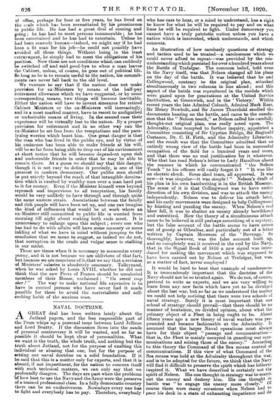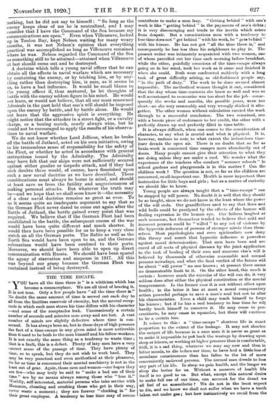NAVAL DOCTRINE.
A GREAT deal has been written lately about the
Jutland papers, and the leas responsible part of the Press whips up a personal issue between Lord Jellicoe and Lord Beatty. If the discussion flows into the sands of personal controversy it will be wasted, and so far as possible it should be kept clear of personalities. What we want is the truth, the whole truth, and nothing but the truth about Jutland, not f or the purpose of exalting this individual or abasing that one, but for the purpose of setting our naval doctrine on a solid foundation. If it be said that this is a matter only for experts, and that it is absurd, if not impertinent, for the nation to concern itself with such technical matters, we can only say that we profoundly disagree. The days are past when the problems of how best to use the Navy and the Army were the preserve of a trained professional claes. In a fully democratic country there can be no exclusiveness. Nowadays every one has to fight and everybody has to pay. . Therefore, everybody who has ears to hear, or a mind to understand, has a right to know for what he will be required to pay and on what lines he will be required to fight. Under democracy you cannot have a truly patriotic nation unless you have a nation which is interested, which understands, and which consents.
An illustration of how carelessly questions of strategy and tactics used to be treated—a carelessness which we could never afford to repeat—was provided by the mis- understanding which persisted for over a hundred peens about the Battle of Trafalgar. The common belief, hold even in the Navy itself, was that Nelson changed all his plans on the day of the battle. It was believed that he and Collingwood, contrary to the original plan, attacked simultaneously in two columns in line ahead ; and this aspect of the battle was reproduced in the models which were gazed upon for generations at the United Service Institution, at Greenwich, and in the 'Victory.' Within recent years the late Admiral Colomb, Admiral Mark Kerr, Sir Henry Newbolt, and Sir James Thurafield studied the documents bearing on the battle, and came to the conclu- sion that the "Nelson touch," as Nelson called his carefully thought-out original plan, was really acted upon. The Admiralty, thus tempted to further inquiry, appointed a Committee consisting of Sir Cyprian Bridge, Sir Reginald Custance, Dr. C. H. Firth, and the Admiralty Librarian, and the result was that the Committee admitted that an entirely wrong view of the battle had been in successful occupation of the field for a hundred years and more, and that there was no real justification for it whatever. Who that has read Nelson's letter to Lady Hamilton about the manner in which he communicated "the Nelson Touch" to his officers will easily forget it ? "It was like an electric shock. Some shed tears, all approved. It was new—it was singular—it was simple I" Nelson's draft of his plan in his own handwriting is in the British Museum. The sense of it is that Collingwood was to have entire direction of his own division, and was to attack the enemy independently. Nelson was to deliver his attack later, and his early movements were designed to help Collingwood by feinting and puzzling the enemy. When Nelson's real blow fell, it was to shatter an enemy already bewildered and outwitted. How the theory of a simultaneous attack came to be believed is still perhaps something of a mystery, but the false account of the battle seems to have arisen out of gossip at Gibraltar, and particularly out of a letter written by Captain Moorsom of the 'Revenge.' So thoroughly, however, was the false account, built up, and so completely was it received in the end by the Navy, that in the Signal Book of 1816 a new signal was intro- duced for making the movement which was supposed to have been carried out by Nelson at Trafalgar, but was, as a matter of fact, never employed!
It would be hard to beat that example of carelessness. It is tremendously important that the doctrine of the Navy should not be so treated again. We do not, of course, pretend to write as experts, and we are very willing to learn from any new facts which have yet to be divulged about the last war, but so far as we understood the matter we could not help noticing that there were two schools of naval strategy. Surely it is most important that one school of strategy should prevail—that there should be no manner of hesitation, no divided opinion, about what the primary object of a Fleet in being ought to be. About fifteen years ago a new theory of naval warfare was, pro- pounded and became fashionable at the Admiralty. It assumed that the larger Naval operations must always have for their object "passage and communication— that is, the Fleet is mainly occupied in guarding our 00.111' munieations and seizing those of the enemy." According to this theory the Command of the Sea means control of communications. If this view of what Command of the Sea means was held at the Admiralty throughout the vat, and is to be adopted for the future, we think that the Navy will find it difficult to preserve the spirit which has hitherto inspired it. What we have described is certainly not the spirit of Nelson. His one thought in strategy was to search out the enemy and deatroy him. His one thought in battle was "to engage the enemy more closely." Of course there were many occasions when Nelson had to pace his deck in a state of exhausting impatience sad do nothing, but he did not any to himself : "So long as the enemy keeps clear of me he is neutralized, and I may consider that I have the Command of the Sea because my communications are open." Even when Villeneuve, locked up in Toulon Bay, kept Nelson waiting for many weary months, it was not Nelson's opinion that everything practical was accomplished so long as Villeneuve remained where he was. Nelson regarded the Command of the Sea as something still to be attained—attained when Villeneuve at last should come out and be destroyed.
A doctrine which tells a young naval officer that he can obtain all the effects in naval warfare which are necessary by containing the enemy, or by tricking him, or by any- thing rather than destroying him, is sure, as it seems to us, to have a bad influence. It would be small blame to the young officer if, thus nurtured, he let thoughts of battle with the enemy seldom figure in his mind. He would not learn, or would not believe, that all our most renowned Admirals in the past held that one's will should be imposed upon the enemy by battle, and by battle alone. He would not learn that the aggressive spirit is everything. He might notice that the attacker in a street fight, or a cavalry charge, or a boxing match, nearly always wins, but he would not be encouraged to apply the results of his observe- lions to naval warfare.
We do not know whether Lord Jellicoe, when he broke off the battle of Jutland, acted on his own initiative, owing to his tremendous sense of responsibility for the safety of the Fleet, or whether he acted in accordance with general instructions issued by the Admiralty. The Admiralty may have felt that our ships were not sufficiently secured against either gunfire or torpedo attack, and if they had such doubts these would, of course, have flourished upon such a new naval doctrine as we have described. These considerations must always be borne in mind, and should at least save us from the futility and ungraciousness of making personal attacks. But whatever the truth may be—and we hope that we shall soon know it—the necessity of a clear naval doctrine remains as great as ever. To us it seems quite an inadequate argument to say that as the German Fleet never dared to come out again after the Battle of Jutland, the battle gained every point that was required. We believe that if the German Fleet had been annihilated in the battle, the subsequent course of the war would have been quite different and much shorter. It would then have been possible for us to keep a very close watch on all the German ports. The Baltic as well as the North Sea would have been open to us, and the German submarines would have been confined to their ports. Moreover, we should have been able to open up direct communication with Russia. We should have been spared the agony of starvation and suspense in 1917. All this was beyond our grasp because the German Fleet was contained instead of being destroyed.







































 Previous page
Previous page